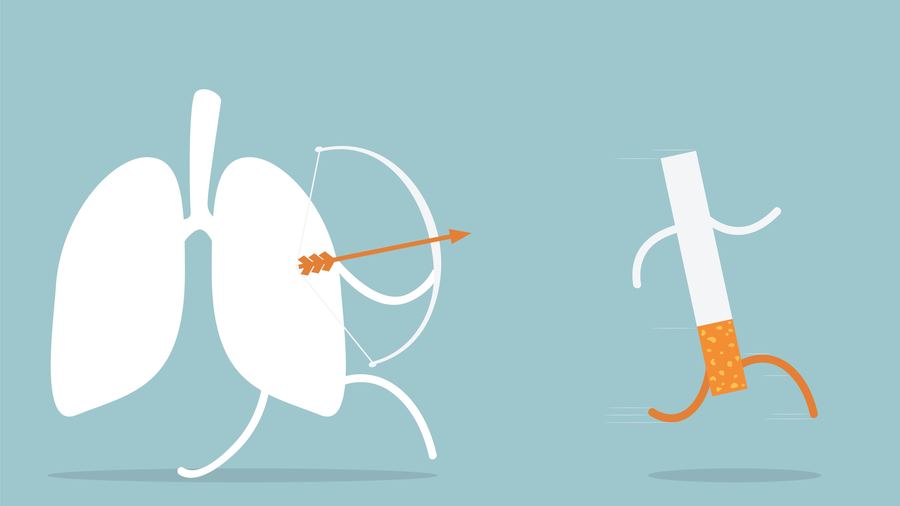Imagine being able to avoid smoking for 24 hours. You told your family you’re quitting, slept early to experience fewer cravings, and googled how to keep busy without cigarettes. You’re feeling good, and everything is going according to plan… UNTIL something stressful happens.
The moment you get anxious, you start thinking about having “just one”. Soon enough, smoking is all you think about, and even though you try to stay away from cigarettes, you feel unable to cope and end up relapsing and feeling defeated.
So, how do you quit smoking if anxiety is your kryptonite? Truth be told, you can’t wait for the right time when your life will be totally stress-free. That moment will probably never come. The only viable solution is to learn how to handle stress BEFORE smoking your last cigarette. That’s what Mary did.
Mary is a 48-year-old wife, mother, and accountant who had been smoking a pack a day for 31 years. She had a colorful, caring, and fun personality that was often dimmed by her anxiety. Even though her family was her everything, the toll of her busy life increased her stress, which decreased the quality of her life and affected her relationships.
Mary believed smoking was the only thing that helped her manage her stress (at least the only thing she knew). At the same time, she hated being a smoker. The smell, cost, guilt, and inconvenience made her think about quitting almost every day. Yet, it was only after her doctor warned her that her lungs weren’t functioning properly… that she really felt the pressure.
“I felt it was urgent to quit for my children no matter how much I needed it to relax,” she said, “I wanted just to quit and never think about it again.”
Mary tried to quit, many times, with nicotine patches, gums, and vaping, but she couldn’t stay away from cigarettes for more than a couple of days. No matter how much nicotine or willpower she used, she always ended up relapsing. As she later realized, the reason for all these slips was that she was abstaining from cigarettes. Not quitting them.
And there’s a BIG difference between “quitting” and “abstaining.”
Abstaining from smoking means continuously using your willpower to resist smoking. Quitting smoking means not wanting to smoke any more.
Abstaining from smoking means PAUSING your habit.
Quitting smoking means ENDING it.
When you pause your addiction, you are doomed to resume it. When you end it, you’re free.
Here’s how Mary recognized the #1 thing holding her back from really quitting smoking and how she turned things around.
Why Mary Couldn’t Quit Successfully
Mary was doing a lot of things right. She didn’t allow anyone to smoke inside her house and she even threw her ashtrays away. But none of those actions kept her from lighting up when she was stressed.
“When I was sorting out our bills, or when I had an argument with my husband or my boss… I wanted a smoke more than anything in the world. I needed it, so I smoked.
The problem is that I was blaming everyone else for not feeling ready to quit. Until I realized that I was obviously doing something wrong. I just didn’t know how to relax without smoking.”
That was Mary’s biggest “aha” moment: Realizing there could be new, better, and more effective ways she could relax that didn’t involve smoking. As soon as trusted in that possibility, she started looking for coping strategies and things to do when she was stressed.
“I spent a lot of time and money on nicotine gums, patches, and vaping- you know, the kind of stuff you can do instead of smoking, but, it wasn’t working, I still felt stressed, still wanted my smokes… and I still felt anxious when I didn’t have a cigarette near me.”
Then “fate” stepped in…
“CBQ Method was a Facebook suggestion based on some other pages I’ve liked”, said Mary, “I followed that to the website where I read all the free stuff and attended the free introductory webinar that leads up to the CBQ Program. After reading many reviews about Nasia Davos and quitting smoking with the CBQ Method, I decided to give it a try.”
My hesitation was you didn’t really know what the flow of an online course would be, and the other side was convincing my husband it was worth that much money!”
“But I convinced him,” Mary laughed, “he could tell that I was really serious about it. I kept telling him that the CBQ method is really good. I needed to find ways to relax from stress while quitting and learn how to cope with my problems without cigarettes in general. And the CBQ method did exactly that.”
“I hope you won’t get mad, but I shared with my husband that video where you give this technique that makes you stop thinking about smoking, and it changed his mind completely. It showed him there was a lot of meat. This wasn’t ‘throw your cigarettes and wake up the next day waiting for a miracle’, it was more like ‘watch the videos, do the exercises, and you will learn how to be a non-smoker.”
Mary said it perfectly! (And no, of course, I wouldn’t get mad! My videos are made to be shared!)
How Mary Smashed Her Anxiety while Quitting Smoking with the CBQ Method
What made the biggest difference for Mary were the lessons from Day #8 of the CBQ Program.
“Whenever I had a craving, I’d think about it in terms of ‘what should I say to myself, what should I do to relax without smoking?’ I kind of knew I have to do something when I have a craving, but before using the CBQ method, I didn’t really know how important it was and how to do it. So I wasn’t doing it. Instead, I was eating. ”
Why does relaxing from stress matter so much?
“Well, when you feel stressed, all you want is to take a puff. And if you don’t see through your anxiety, then you will smoke, or eat and then smoke anyway.
Now I know how to calm down when I have a problem or when my boss is unreasonable and unfair. I can actually prepare and be ready for stress. That was really a turning point for me in my life. “
Mary really committed to learning and experimenting with how to manage her stress while quitting smoking. A big part of that was practicing with her husband and children.
“They’d push my buttons and wait for my reaction. The first time they challenged me I wasn’t that good, but the second time I was way better.”
“I’ve thought a lot about it over the last few weeks,” said Mary, “I haven’t changed as a mother, a wife or a person. I am still alert, caring, fun, loving and sarcastic. What I’ve changed is my ability to shine through the clutter of my stress. Since I quit I’ve been much more relaxed, and I don’t get agitated that easily.”
Mary quit smoking, and when it came to reflecting on how her investment paid off, she realized how far she’d come.
“In terms of money, I saved over $2000 in the last year. As an ex-smoker, I was able to get a better deal on life insurance, and my medical bills have decreased. Funny thing, I also got a raise!”
Also, Mary’s family is enjoying her more than ever.
“I am really proud of myself, and my family is really proud of me too. The odd breathing problems I had in my late 40s, disappeared, and I didn’t put on a single pound because I didn’t miss smoking. Now I can play with my children without coughing, and I can focus better on my work and finish faster because I don’t have to take cigarette breaks!
The most important thing for me was showing my family how much I care for them, and the worry of getting cancer or COPD and becoming a burden to them… is gone.
Ah! And I realized that most of the times I was fighting with my husband, were when I needed to smoke. Now that’s behind me. I am so much better off…”, “I feel free.”
What the Future Has In Store for Mary
Mary isn’t done yet – she’s looking toward the future and has continued using the CBQ strategies to keep her stress levels as low as possible and maintain her smoke-free life.
“Next year I plan to get another raise so I can take my whole family on vacation and support my mother financially.”
“This might be my first year as a smoke-free woman, but I know that whenever I feel anxious, I can check the CBQ exercises.”
Mary realized that the problem with failing to quit smoking was not having the right plan. Once she prepared, experimented, and put in the work, she was able to overcome even the most intense cravings.
The result? A healthier lifestyle, a calmer mind, and a better relationship with her loved ones.
Key Takeaways – Tips
- Nicotine gums, patches and vaping won’t help you quit or protect you from relapse when you feel stressed. Only your mind and your preparation can help you.
- When you have a craving try to do something to keep your hands and mind busy.
- Make a list of all the things that stress you out. Then role-play these situations with your family and friends (or even alone) before your quit date. This will help you be more prepared.
- Breaking free from nicotine WILL improve your health, finances, and relationships. Most importantly, quitting smoking will improve your mental health and decrease your anxiety and depression – this has also been proven by research.
*We always share success stories with permission or use pseudonyms to protect our members’ privacy.



